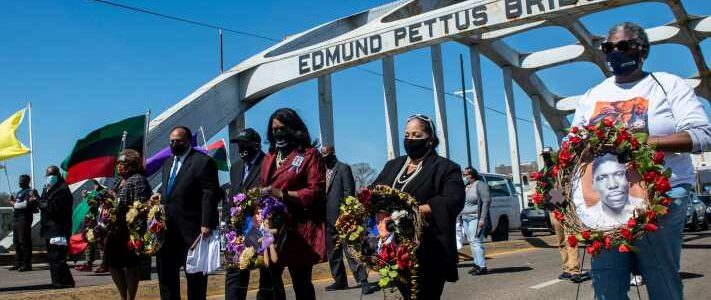
Virtual service, no John Lewis: ‘Bloody Sunday’ in Selma looked different, remained strong
SELMA, Ala. — The process was different for this year’s commemoration of “Bloody Sunday” in Selma, but the spirit was the same.
Because of the COVID-19 pandemic, the 56th commemoration of the event was largely virtual. And the event was missing one of its regular attendees – John Lewis. The civil rights icon passed away last year at the age of 80.
But the event still memorialized the proceedings of March 7, 1965, when hundreds of civil rights foot soldiers crossed the Edmund Pettus Bridge in an attempt to march to Montgomery in support of voting rights for Blacks.
They were met on the east side of the bridge by Alabama State Troopers and mounted sheriff’s posse men and brutally beaten. The images of that day and the national outrage that resulted helped led to the passage of the Voting Rights Act of 1965. In the wake of the carnage on the bridge, the Rev. Martin Luther King Jr. put out a call for people to come to Selma. Two weeks later another march began. That time it succeeded in reaching Montgomery.
Read more on race and identity: Sign up for USA TODAY’s This Is America newsletter
Martin Luther King III, from left, civil rights icon Bernard Lafayette, Rep. Teri Sewell and foot solider Sheyann Webb-Christburg lead the march during the 56th Selma Bridge Crossing Jubilee on the Edmund Pettus Bridge in Selma, Ala., on Sunday, March 7, 2021. (Photo: Jake Crandall/ Advertiser)
President Joe Biden marked the day with the signing of an executive order which promotes voting registration and access. It also directs heads of federal agencies to give federal employees time off to vote or to serve as non-partisan poll workers and revamps the government’s Vote.gov website.
“Every eligible voter should be able to vote and have it counted,” the president said. “If you have the best ideas, you have nothing to hide. Let the people vote.”
‘Let the people vote’: Biden signs executive order promoting voter access, marking anniversary of Selma march
Before a virtual re-enactment of a bridge crossing, speakers took part in the Brown Chapel service. The historic African Methodist Episcopal church served as headquarters and sanctuary for the Selma Movement.
There were speeches from national leaders, singing of gospel and freedom songs, looks back on history and looks forward to challenges of today of racism and efforts at voter suppression.
History brought people together over social media and the Selma Bridge Crossing Jubilee website, which broadcast the events of the weekend, said AME Bishop Harry L. Seawright.
“We salute all people who crossed that bridge on Sunday,” he said “It was only an act of God no one was killed.”
Source: Read Full Article
